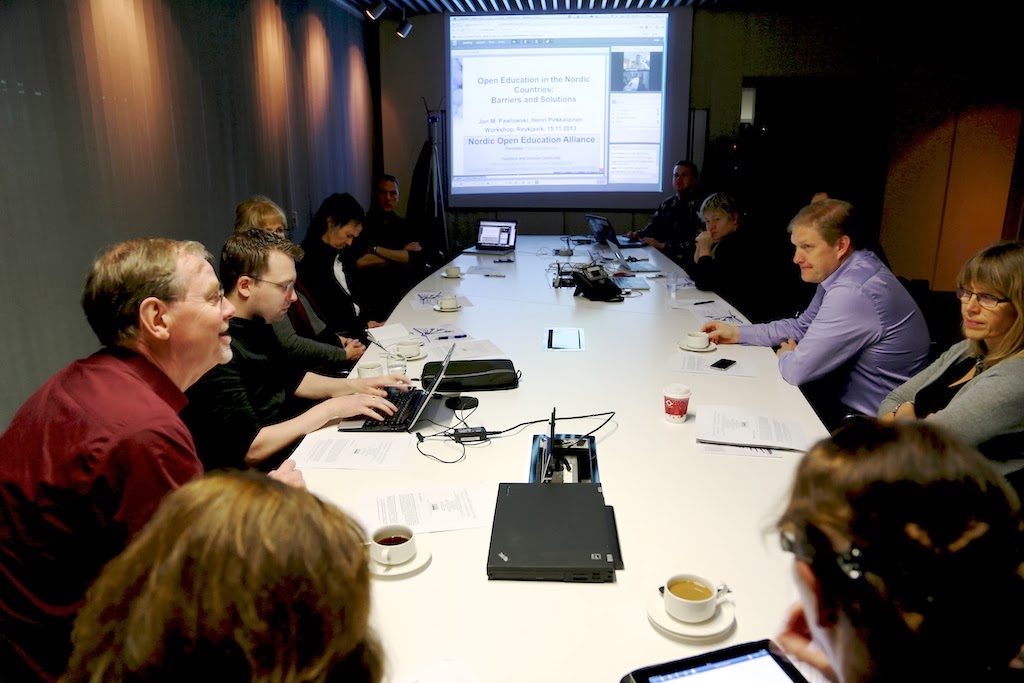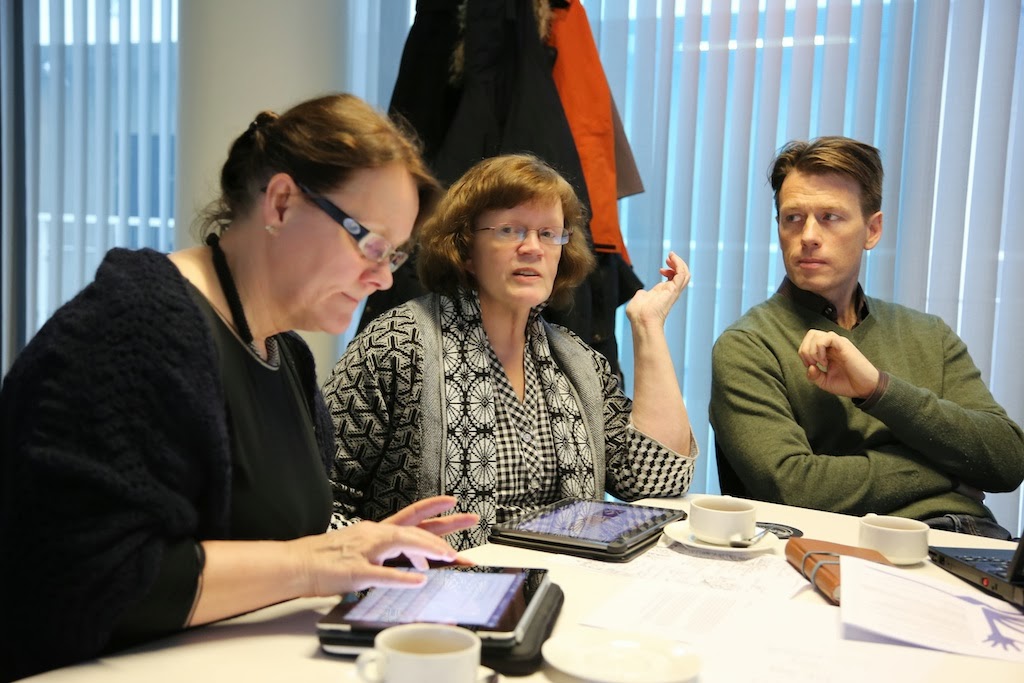Adult Education and OER: conclusions and policy recommendations for Europe
Paul Bacsich - October 21, 2015 in adulteducation, featured, mooc, OEP, oer, Open Educational Resources
Paul Bacsich - October 21, 2015 in adulteducation, featured, mooc, OEP, oer, Open Educational Resources
guestauthor - October 12, 2015 in featured
 An interesting study was shared in the OKFN edu mailing list by Nicole Allen (@txtbks) Director of Open Education for @SPARC_NA, regarding the real value of open textbooks and the real costs of traditional textbooks. The study referred by Nicole is a multi-institutional study conducted by researchers at Brigham Young University looks at the academic outcomes of students assigned free, openly-licensed textbooks versus those assigned traditionally-published textbooks.
An interesting study was shared in the OKFN edu mailing list by Nicole Allen (@txtbks) Director of Open Education for @SPARC_NA, regarding the real value of open textbooks and the real costs of traditional textbooks. The study referred by Nicole is a multi-institutional study conducted by researchers at Brigham Young University looks at the academic outcomes of students assigned free, openly-licensed textbooks versus those assigned traditionally-published textbooks.
The study titled A multi-institutional study of the impact of open textbook adoption on the learning outcomes of post- secondary student looks at a sample of more than 16,000 students across 10 institutions, comparing several measures of student academic success between those using open textbooks and those using traditional textbooks.
What the study finds is the opposite of what folk wisdom tells us: expensive textbooks are not superior to free ones. In fact, the results show a striking trend that students assigned free, open textbooks do as well or better than their peers in terms of grades, course completion, and other measures of academic success. Here are some of the key points:
Nicole wrote up a longer blog post about the study for the Huffington Post here.
Also, Nicole, recommends to have a look to the Review Project, which collects peer reviewed research on OER impacts.
Guest - October 1, 2015 in featured, guestpost, oer, Open Educational Resources
Given the topicality of the OER Research Hub recent research outputs we are pleased to be able to reproduce on our blog a post from Robert Schuwer on how he is using the data that the OER Research Hub has generated, especially that on formal learners and educators.
The post was authored by Robert Schuwer and edited on to the blog by Paul Bacsich. For Robert’s original posting see http://robertschuwer.nl/blog/?p=1213
Guest - September 9, 2015 in Open Educational Resources
 Tijdens de afgelopen zomervakantie is de eerste versie van het Open Education Information Center (OEIC) van het Open Education Consortium gepubliceerd. Het doel van het OEIC is antwoord te verschaffen op allerlei vragen die bij het bezig zijn met Open Education naar boven kunnen komen. Het vervangt de Toolkit die eerder vanaf die website toegankelijk was, maar die sterk verouderd was.
Tijdens de afgelopen zomervakantie is de eerste versie van het Open Education Information Center (OEIC) van het Open Education Consortium gepubliceerd. Het doel van het OEIC is antwoord te verschaffen op allerlei vragen die bij het bezig zijn met Open Education naar boven kunnen komen. Het vervangt de Toolkit die eerder vanaf die website toegankelijk was, maar die sterk verouderd was.
Bij de opzet van het OEIC is ervoor gekozen om vijf ingangen te kiezen:
Bij iedere categorie zijn vragen verzameld vanuit de praktijk. Deze vragen zijn binnen de categorie ingedeeld in clusters. Een voorbeeld van zo’n cluster is Using OERs in my classroom in de categorie Faculty. Het antwoord bij iedere vraag bestaat uit een korte tekst en verwijzingen naar bronnen (meestal websites) met een uitgebreidere toelichting.
Deze vraagbaak zal voortdurend worden aangevuld met nieuwe vragen. Iedere gebruiker kan eigen vragen indienen via een Submit Info button op de startpagina van het OEIC. Dat gaat nu nog via e-mail, maar het is de bedoeling hier een webformulier achter te plaatsen.
Behalve vragen indienen kunnen ook opmerkingen over antwoorden en suggesties voor bronnen bij bestaande vragen worden voorgesteld. Bij iedere vraag is ook een item gemaakt in een Community Forum. Gebruikers kunnen hun opmerkingen bij een vraag ook daar achterlaten. Zoals bij veel van dergelijke communities is er nog weinig activiteit daar. Een grotere bekendheid van het OEIC, resulterend in meer traffic, is voorwaardelijk voor meer community activiteit.
Vorig jaar hebben Bert Frissen (Avans, maar inmiddels pensionado), Pierre Gorissen (HAN) en ondergetekende een opzet beschreven voor functies die een dergelijke informatiesite beter toegankelijk zouden maken voor iedere belangstellende, met name voor docenten die bij adoptie van OER problemen ondervinden. Het OEIC beschouw ik als een eerste aanzet van implementatie van dat idee. Wat mij betreft zou een eerste uitbreiding bestaan uit het categoriseren van de bronnen waarnaar verwezen wordt in vereist kennisniveau van het betreffende onderwerp om de bron nuttig te laten zijn (bijvoorbeeld geen of weinig kennis vereist – gemiddelde kennis vereist – veel kennis vereist). Tevens zou de ingang naar te onderscheiden aspecten die nu deels in de clusters is terug te vinden wellicht moeten worden verfijnd.
Het Open Education Consortium heeft mij gevraagd de verdere uitbouw van het OEIC aan te sturen. Ik heb volmondig ja hierop gezegd omdat ik een one-stop-shop waar iedereen met belangstelling voor Open Education terecht kan uiterst waardevol vind voor adoptie van Open Education.
Ik ben erg benieuwd naar ervaringen die gebruikers met deze site hebben. Schroom niet die te delen met het Open Education Consortium en, indien u tevreden bent, maak reclame voor deze site in uw netwerk. Gebruik en participatie in het forum is voor iedereen; je hoeft dus geen lid te zijn van het Open Education Consortium (hoewel ik lidmaatschap wel wil bepleiten, maar dat is een ander verhaal).
guest - November 28, 2013 in data, featured, guestpost, oer, world
 We are now on the fifth in our series of blog posts on open education around the world! Tryggvi Thayer from Iceland has written about how the close knit Icelandic community have taken to open educational resources (OERs) and begun using them with great enthusiasm.
We are now on the fifth in our series of blog posts on open education around the world! Tryggvi Thayer from Iceland has written about how the close knit Icelandic community have taken to open educational resources (OERs) and begun using them with great enthusiasm.
Tryggvi is based at the University Of Iceland in the School of Education. He is a Project manager for Education Plaza, working with educators’ communities of practice to enhance professional development and develop innovative approaches to address educational issues.
You can contact Tryggvi by email or Twitter.
******
Within the Icelandic educational community, open educational resources (OERs) have been met with intrigue, enthusiasm, or scepticism, depending on who you talk to and the fleeting political climate of the moment. Yet, for a small country with its own native language, OERs can provide a means of making available high quality, up-to-date educational resources far more efficiently than established methods. Recently, a group of educators, academics, policy makers and free society/software/knowledge advocates got together and explored ways to make OERs more acceptable and accessible for Icelandic educators.
Here’s a little slice of reality-pie, Icelandic style:
What do you do?
Here’s what Icelanders have done: Essentially the same as everyone else, even though their circumstances are drastically different. They get together a few subject experts, have them produce a manuscript, publish it, distribute to schools and students, update as needed. My own experience provides some insight as to how this has worked out. In upper-secondary school, I followed an academic track with a focus on pedagogy. Obviously, psychology was an important component of my education. Throughout my studies, we were constantly promised a series of brand new psychology textbooks. They never materialized. We were supplied with photocopied excerpts of early drafts of the books, in addition to supplemental materials based on old, out-dated resources. Finally, in my fourth and final year, the new textbooks were available. They were colourful, shiny, and thick. Sadly, however, much of the material was also out-dated. And so, the cycle began again to produce an updated text.
For a country like Iceland, OERs are a potential godsend. The notion that we can tap into educators’ wealth of experience and expertise to address our unique issues is a very attractive one. Alas, though there has been some discourse on OERs over the past several years, we have yet to see evidence of their widespread creation, distribution, or use. There have been some initiatives in the past that were meant to encourage educators to share educational resources, but all have failed to produce the anticipated results. And one of our big problems is that we don’t know why!

OER Workshop: The workshop coordinators, Dr. Jan Pawlowski and Henri Pirkkalainen, ended up being stuck in Greenland due to weather. A teleconference was quickly set up and all went more or less as planned.
A couple of weeks ago, an opportunity presented itself to conduct a workshop in Reykjavík, Iceland on OERs with Dr. Jan Pawlowski and doctoral candidate, Henri Pirkkalainen, specialists in OER and open education from Jyväskylä University in Finland. The workshop was organised by Sigurbjörg Jóhannsdóttir, of Reykjavík University, on very short notice, who did an incredibly admirable job of bringing together a diverse group of interested individuals that included, academics, policy makers, practitioners, and advocates for open society. The focus of the workshop was to identify barriers and opportunities related to the use of OERs in the Icelandic educational system.
Among the opportunities identified are:
Some of the barriers include:
At the end of the workshop it was decided to carry on with the work that was started through two courses of action; one focusing on practical dimensions, the other on policy dimensions. Firstly, to address the practical dimensions, a “plaza” will be launched under the auspices of the Education Plaza to inform school communities about OERs; to encourage collaboration within and among distinct communities of interest; and to address specific issues relating to the use of OERs, such as working to establish a repository for Icelandic OERs. Secondly, to address policy issues, Iceland has joined the Nordic OER network that aims to influence policy relating to the use of OERs on a transnational Nordic level. The network includes members from a range of stakeholder organizations throughout the Nordic countries.

Workshop participants split up into groups to brainstorm about barriers and opportunities in Iceland.
Education Plaza is a project backed by the Ministry of Education, the Icelandic universities providing teacher training, the Icelandic Teachers’ Union, the City of Reykjavík’s Department of Education, and the Federation of Icelandic Municipalities. The objective of the project is twofold: to promote collaborative approaches to continuing education and professional development within the school community; and to strengthen links between practitioners and the academic community within the universities. Education Plaza works with self-organising professional communities of educators that focus on specific topics of mutual interest. The topic-specific communities that currently work with Education Plaza are, the Language Learning Plaza, the Science Education Plaza, the Special Education Plaza, the IT Plaza, and the Philosophy in Education Plaza. Several additional plazas are currently in the planning stage, including, an Entrepreneurship Education Plaza, a Maths Education Plaza, and a School Leadership Plaza.
Situating the on-going work regarding OERs in Iceland within the Education Plaza’s community will provide important linkages to a range of interest groups that are currently transforming education in Iceland. There have already been calls within the community for actions that would make OERs more accessible. Thus, the OER Plaza will be addressing what is already an identified need. However, many of the barriers that were discussed in the workshop still need to be addressed. In some cases, the barriers stem from deeply rooted professional and organisational cultures and attitudes. It would be very unrealistic to assume that these can be overcome merely by establishing a plaza. That sort of a “build it and they will come” thinking has been the downfall of far too many preceding projects. Nevertheless, we feel that we are making great strides in the work that we are currently doing and look forward to cultivating a thriving community that will support and encourage widespread creation, sharing and use of OERs in Iceland.
Education Plaza (in Icelandic): http://www.menntamidja.is
Tryggvi Thayer’s website (in English): http://www.education4site.org
Photos [CC-BY] Sibba Jóa
Article [CC-BY-SA] Tryggvi Thayer